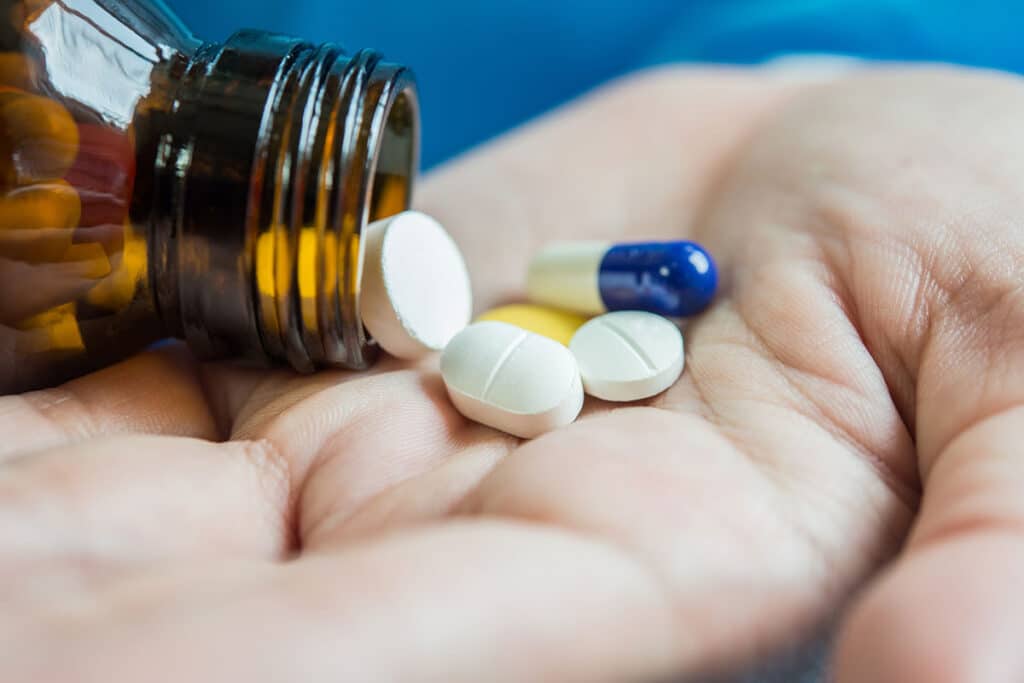Yes, you can overdose on trazodone. Trazodone overdoses are rarely fatal when the drug is not taken in combination with other substances, but they can still cause serious health concerns. Being aware of the risks and consequences associated with this medication is key to balancing effectiveness with safety. Trazodone overdose symptoms can appear quickly, requiring immediate medical attention to support a healthier outcome.
Key Points
- Trazodone is an antidepressant medication that increases serotonin levels in the brain
- Yes, you can overdose on trazodone, though overdoses are rarely fatal
- Understanding the risk factors and signs of an overdose is essential to patient safety
What Is Trazodone?
Trazodone is an FDA-approved antidepressant medication that belongs to a class of drugs called serotonin antagonist and reuptake inhibitors (SARIs).[1]
Most people are more familiar with selective serotonin reuptake inhibitors, or SSRIs. Both SSRIs and SARIs are commonly prescribed for patients with depression and anxiety disorders, but they differ slightly in their mechanisms.
Both types of medication can increase serotonin levels by preventing neurons from reuptaking (reabsorption by a neuron of a neurotransmitter) this crucial chemical messenger. However, SARIs like trazodone are also “antagonists” at serotonin receptors, meaning they can bind with them without actually activating them.[2] SARIs are typically prescribed for major depressive disorder.
Additional uses for trazodone include the following:
- Insomnia – commonly prescribed off-label for sleep problems
- Anxiety disorders – sometimes used with other treatments
- PTSD-related nightmares can reduce nightmare frequency
Available Formulations
Trazodone is most commonly available in the following strengths:[3]
- 50 mg tablets
- 100 mg tablets
- 150 mg tablets
- 300 mg tablets
The medication is typically taken with food to reduce stomach upset and improve absorption. Trazodone is found in various branded medications, including Desyrel, Oleptro, Desyrel Dividose, and Raldesy.
Trazodone Side Effects
While trazodone is a generally well-tolerated drug when used as directed, it still comes with potential side effects. Understanding typical side effects and how to differentiate them from more severe concerns is essential to your safety.
Common Side Effects
Most people taking trazodone experience mild to moderate side effects, including, but not limited to, the following:[4]
- Drowsiness – the most common effect
- Dizziness – especially when standing up
- Dry mouth – affects many users
- Blurred vision – usually temporary
- Nausea – often improves with time
- Headache – typically mild
- Fatigue – may decrease as your body adjusts
Your chance of experiencing specific side effects may be influenced by several individual factors. For example, elderly patients and those with kidney or liver dysfunction may need to use trazodone with caution or find an alternative due to the side effects, which can include increasing the risk of falls and cardiac issues.
Taking trazodone alongside other substances can also significantly increase the risk of more serious side effects and/or overdose. Central nervous system depressants and various drugs that inhibit the activity of certain liver enzymes (CYP3A enzymes) can change how trazodone affects the body.[5]
Serious Side Effects
As long as you are clearly communicating with your healthcare provider about the above symptoms, you should not require urgent medical attention (although adjustments may be made to your medication regimen).
If you notice irregular heart rhythms, however, you should contact your prescribing physician immediately.[6] Other, more serious symptoms of trazodone include priapism (painful erection lasting more than four hours), severe dizziness, and unusual bleeding.
These symptoms are possible even when taking therapeutic (not overdose-level) doses of trazodone. Always inform your healthcare provider of any symptoms you experience.
Understanding Trazodone Overdose
Trazodone is not officially classified by the Drug Enforcement Administration (DEA) as a controlled substance. This doesn’t mean the drug has no potential to cause harm, but it does reflect its low abuse potential. Accidentally or intentionally, trazodone overdoses still occur.
This antidepressant does not cause euphoria at therapeutic or larger doses. Some people still misuse drugs like trazodone due to their relaxing (sedative) effects, but it does not produce a “high” in the same sense that a stimulant or an opioid would.
How Common Is a Trazodone Overdose?
Compared to other antidepressants and more commonly abused drug types, trazodone overdose is relatively uncommon. Fatal overdoses are rare when trazodone is taken on its own, and most trazodone-related deaths involve combining trazodone with other substances, whether they are prescription medications, recreationally used drugs, or alcohol.[7] Trazodone has low addiction potential. Clinical studies show no significant drug-seeking behavior among patients taking trazodone.[8]
Recognizing Signs of a Trazodone Overdose
Trazodone’s effects on the central nervous system (brain and spine, which are the body’s primary control center) allow it to influence several other structures and systems throughout the body. This is why overdose symptoms may seem unpredictable and unrelated, but may include:[9]
Cardiovascular problems are common when an overdose occurs. These serious side effects include:
- Irregular or slow heartbeat
- Low blood pressure
- Chest pain
- Fainting or near-fainting
Due to trazodone’s interactions with the brain, it can cause severe and highly alarming neurological symptoms, including:
- Extreme drowsiness or inability to wake up
- Seizures
- Confusion or disorientation
- Loss of coordination
- Coma in severe cases
Respiratory problems associated with trazodone overdose that require immediate attention include:
- Difficulty breathing
- Shallow or slow breathing
- Complete breathing stoppage
Other concerning signs include:
- Hyponatremia (low sodium in the blood)
- Severe nausea and vomiting
- Tremors or muscle twitching

Overdose Risk Factors
In the same way that various individualized factors can affect your likelihood of experiencing certain trazodone side effects, they can also affect your risk of experiencing an overdose.
For example, elderly adults typically have a slower metabolism, meaning they tend to process medications more slowly. Taking your next dose too soon, or consuming alcohol or other substances without waiting long enough, significantly increases your risk of an overdose.
People with kidney or liver problems may also be at a greater risk of trazodone overdose or other complications. These issues impair your body’s ability to break down the medication efficiently.
Several other factors, including the concurrent use of multiple medications, pre-existing heart conditions, and others, can influence how your body responds to trazodone. Your healthcare provider will comprehensively assess all of these points to determine whether you are a fit candidate for trazodone.
Harmful Drug-Drug Interactions
Exploring the specifics of how certain substances affect the body when combined with trazodone will help you to recognize and respond in an overdose situation.
Combining trazodone with the following substances will have the following effects:[10]
- Alcohol – Can significantly increase the sedative effects of trazodone
- Benzodiazepines – Can increase the likelihood of respiratory depression*
- Other antidepressants – Can cause serotonin syndrome*
- Sleep medications – May compound drowsiness
*Respiratory depression is a potentially life-threatening condition characterized by short and shallow breaths.
*Serotonin syndrome is another life-threatening condition associated with excessive serotonin levels in the brain. Symptoms include agitation, high fever, seizures, loss of consciousness, sweating, and more.
What to Do in the Event of a Trazodone Overdose
Whether for yourself or someone nearby, if you suspect a trazodone overdose, call emergency medical services immediately. Only when symptoms are mild (below overdose-level severity) should you wait to see if they improve while taking more conservative measures.
While waiting for help, stay with the person and keep them awake if possible. You may be prompted to take several steps while on the phone with emergency medical services, including inducing vomiting, gathering medication bottles to show first responders, and more.
There’s no specific antidote for trazodone.[11] Treatment focuses on managing symptoms until the medication clears from the body.
Recovery Outlook
Most people recover fully from a trazodone overdose with proper medical care. However, long-lasting complications can occur, including brain injuries, heart problems, and erectile dysfunction. Recovery time depends on the amount taken and the speed at which treatment begins.
Take Control of Your Recovery Journey
Trazodone can be an effective part of your treatment plan when used safely. Understanding overdose risks helps you use this medication responsibly.
If you’re struggling with medication compliance or having thoughts of self-harm, reach out to your healthcare provider for support immediately. Trained professionals understand addiction and mental health challenges. They can provide the compassionate care you deserve.Treatment facilities across the country offer comprehensive programs that address both addiction and underlying mental health conditions. You don’t have to face these challenges alone. Find the help you need today and build a brighter future for yourself.




